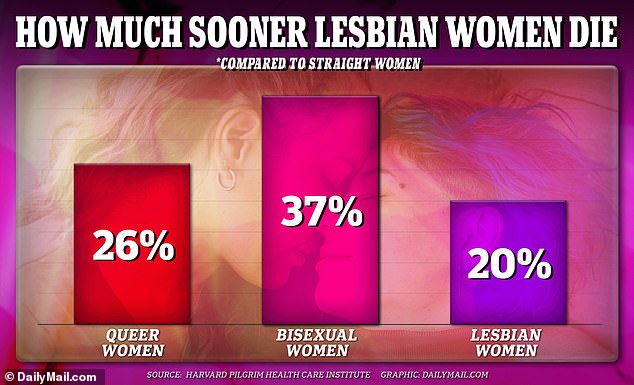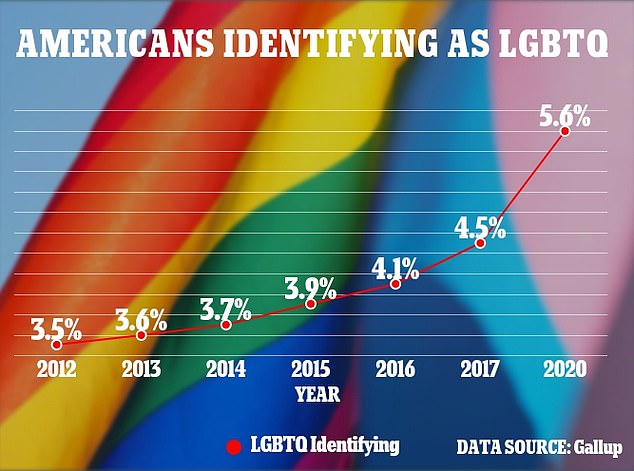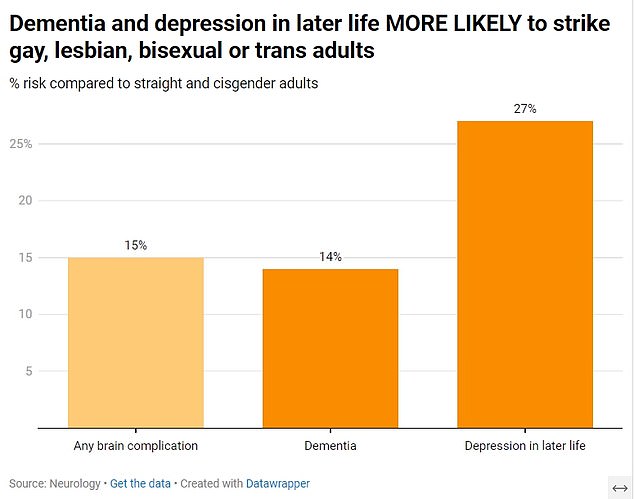LGBTQ+ people are at higher risk of dementia and depression than their heterosexual peers, a study suggests.
Researchers at Yale School of Medicine found that the group had a 15 percent higher risk of overall brain health problems later in life.
This included a 14 percent higher risk of being diagnosed with dementia and a 27 percent higher risk of suffering from depression later in life.
The paper attributed the problem to a “variety of factors,” from psychosocial factors such as stress to physical harm caused by violence and gender-affirming hormones and difficulties accessing health care.
Studies suggest that stress can trigger neuroinflammation and increase the risk of protein clumps forming in the brain, a precursor to diseases such as dementia.
People in the group were also found to be more likely to smoke or abuse substances than their heterosexual peers, which may increase the risk of these conditions.
The graph above shows the percentage increase in risk of dementia and depression in later life among LGBTQ+ adults compared to their heterosexual peers.
Depression in late adulthood is also often thought to be a precursor to dementia, and many studies suggest it may be a reaction to cognitive deficits.
Dr Shufan Huo, the neurologist who led the study, said: ‘In a world that increasingly recognises the crucial role of equitable healthcare, it remains concerning how little is known about the health disparities faced by LGBTQ+ people.
‘Our study looked at this group, which has historically been underrepresented in neurological research, and found they were at increased risk for adverse brain health outcomes.’
The researchers said their study did not prove that sexuality or gender differences caused the problems, but that it had detected an association that was probably caused by other factors.
It is just the latest article to reveal the disparity faced by LGBTQ+ people, after another study found that lesbian women die 20 percent earlier than their peers.
Researchers have previously blamed alcohol abuse for the disparity, estimating that about 25 percent of LGBTQ+ people have a problem with alcohol, compared with five to ten percent of the general population.
Obesity rates have also been highlighted: studies show that lesbian women are 41 percent more likely to be obese than their heterosexual peers. Studies suggest that gay and bisexual men are less likely to be obese than their heterosexual peers.
Researchers suggest that alcohol abuse can cause brain cell death and shrinkage, increasing the risk of neurological diseases.
Obesity can increase the risk of damage to blood vessels, including those in the brain, which can increase the risk of dementia.

Researchers found that bisexual women had the shortest life expectancy, dying 37 percent earlier than heterosexual women, followed by lesbian women, who died 20 percent earlier. Queer women (including bisexual and lesbian women) died, on average, 26 percent earlier than heterosexual women.

An estimated 5.6 percent of all Americans identified as LGBTQ in 2020
It can also overactivate the immune system, according to the U.K.-based Alzheimer’s Society, leading to brain damage.
In the new study, published in NeurologyThe researchers analyzed data from 393,000 people in the All of Us dataset, a U.S.-based health records dataset.
The adults were on average about 51 years old and had enrolled for five years from May 2017 to June 2022.
Of these, 39,000 were LGBTQ+: 15,700 were bisexual (mostly women), 9,300 were gay, 5,000 were lesbian, and 4,000 belonged to a gender minority group.
There were also 8,400 people who said they belonged to a different category. Some people were included in more than one category.
In the group, 21,000 people were diagnosed with a neurological disease.
This included 11,500 people who had suffered from depression in later life, 6,600 people who had suffered strokes and 2,933 cases of dementia.
After adjusting for factors such as age, sex assigned at birth, ethnicity and heart disease, they found that LGBT people had a higher risk of these complications.
They also found that trans people had a 68 percent higher risk of stroke compared to heterosexual, cisgender people.
Limitations of the study included that it did not examine the causes behind the inequalities faced by LGBTQ+ people.
The role of gender-affirming hormone therapy in increasing the risks of these conditions has also not been examined in detail.
Dr Huo added: ‘Our findings underscore the need for further research focusing on health care disparities affecting the LGBTQ+ community.
‘Possible reasons for these disparities include discrimination, stress, access to health care, and political and legal factors.’

